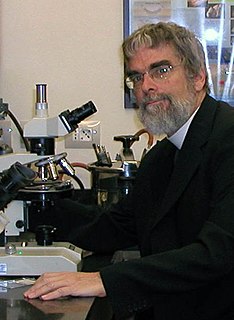A Quote by Albert Einstein
If there is any religion that could respond to the needs of modern science, it would be Buddhism.
Related Quotes
If science proves some belief of Buddhism wrong, then Buddhism will have to change. In my view, science and Buddhism share a search for the truth and for understanding reality. By learning from science about aspects of reality where its understanding may be more advanced, I believe that Buddhism enriches its own worldview.
Oh, that's typical of you modern young men; you've nibbled at science and it's made you ill, because you've not been able to satisfy that old craving for the absolute that you absorbed in your nurseries. You'd like science to give you all the answers at one go, whereas we're only just beginning to understand it, and it'll probably never be anything but an eternal quest. And so you repudiate science, you fall back on religion, and religion won't have you any more. Then you relapse into pessimism...Yes, it's the disease of our age, of the end of the century: you're all inverted Werthers.
Religion needs science to keep it away from superstition and keep it close to reality, to protect it from creationism, which at the end of the day is a kind of paganism - it's turning God into a nature god. And science needs religion in order to have a conscience, to know that, just because something is possible, it may not be a good thing to do.
Since religion intrinsically rejects empirical methods, there should never be any attempt to reconcile scientific theories with religion. An infinitely old universe, always evolving, may not be compatible with the Book of Genesis. However, religions such as Buddhism get along without having any explicit creation mythology and are in no way contradicted by a universe without a beginning or end. Creatio ex nihilo, even as religious doctrine, only dates to around AD 200. The key is not to confuse myth and empirical results, or religion and science.
In all modern history, interference with science in the supposed interest of religion, no matter how conscientious such interference may have been, has resulted in the direst evils both to religion and to science, and invariably; and, on the other hand, all untrammelled scientific investigation, no matter how dangerous to religion some of its stages may have seemed for the time to be, has invariably resulted in the highest good both of religion and of science.
The question has often been asked; Is Buddhism a religion or a philosophy? It does not matter what you call it. Buddhism remains what it is whatever label you may put on it. The label is immaterial. Even the label 'Buddhism' which we give to the teachings of the Buddha is of little importance. The name one gives is inessential.... In the same way Truth needs no label: it is neither Buddhist, Christian, Hindu nor Moslem. It is not the monopoly of anybody. Sectarian labels are a hindrance to the independent understanding of Truth, and they produce harmful prejudices in men's minds.
However the great successes of science - Galileo's telescopic observations, Newton's law of gravity, etc - all of this great success caused people to sort of say, what if we could establish religion on that same successful basis? What if we could have a good rational foundation for religious belief. What if religion could be sort of like science. Of course, that can't be.
Science is like society and trade, in resting at bottom upon a basis of faith. There are some things here, too, that we can not prove, otherwise there would be nothing we can prove. Science is busy with the hither-end of things, not the thither-end. It is a mistake to contrast religion and science in this respect, and to think of religion as taking everything for granted, and science as doing only clean work, and having all the loose ends gathered up and tucked in. We never reach the roots of things in science more than in religion.



































